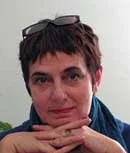By Fanny Julissa García, Summer Institute Communications Coordinator
Dr. Ursula Staudinger, Founding Director of the Robert N. Butler Columbia Aging Center and the associated International Longevity Center, presented presented a lecture and a seminar at the CCOHR 2017 Oral History Summer Institute. Dr. Staudinger is a lifespan psychologist, and her research focuses on the plasticity of the aging process and the implications it has for population aging. Her first presentation took place on June 5th and kicked off two weeks of powerful analysis and exploration on themes related to aging, lifespan psychology, and the cognitive impact of life history interviews on individuals.
The Columbia Aging Center is a co-sponsor of this year’s Institute, and Dr. Staudinger’s keynote lecture, titled, “More Years, More Life: Opportunities and Challenges of Demographic Change” put forward research she has conducted on the opportunities and challenges of a society that is characterized by longer lives, but questions whether this same society is any healthier mentally and physically.
Dr. Staudinger asked the question, “Are we capable of making use of longer lives and maintain productivity?” The answer is yes, but this requires significant investment and changes in our society. She presented the following five steps needed for a more engaged and productive aging population:
Health promotion and sickness prevention for all.
Education across lifespan for all.
More versatile work biographies for all.
Productivity through volunteering.
Making use of the new economy of longer lives: health, education, financial instruments, technology and infrastructure.
Her seminar, titled, “Life Review, Reminiscence and Wisdom” focused on the process of life review- a central process for oral history- from a psychological perspective. Life review is one form of reminiscence that takes more than reconstructing the past from memories. The process of life review also entails an evaluation and explanation part. The way we reconstruct our past from memory is influenced by many factors aside from what happened in the past. We need to be aware of the situational and cultural impact. Other concepts that have been linked with the notion of life review in the psychological literature are autobiographical reasoning and life reflection. She also highlighted the counter intuitive finding that it is not enough to grow old to become wise. Rather, her research shows that the last stage in life pushes to integrate the past instead of questioning it and identifying pros and cons based on which deeper insights about life can be gained.
Dr. Staudinger’s presentation and research was widely quoted at the summer institute days after she presented, and many fellows identified familiar themes in their own research, including many who are working with narrators in early stages of Alzheimer’s, and dementia.
Mary Marshall Clark, Co-Director of the CCOHR 2017 Oral History Summer Institute said the following about Dr. Staudinger’s presentations, “She taught us that the art and science of remembering are deeply interconnected and reinforce the plasticity of the mind throughout the life span, and that creative aging is not only possible but achievable. We are so grateful for her brilliant and thoughtful approaches to the kind of memory work we often do without thinking about it so explicitly.”










